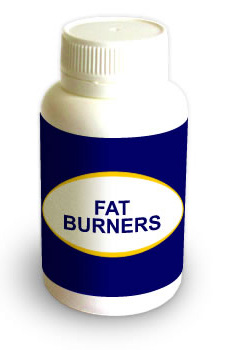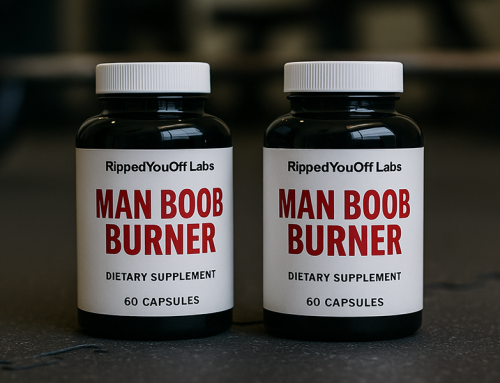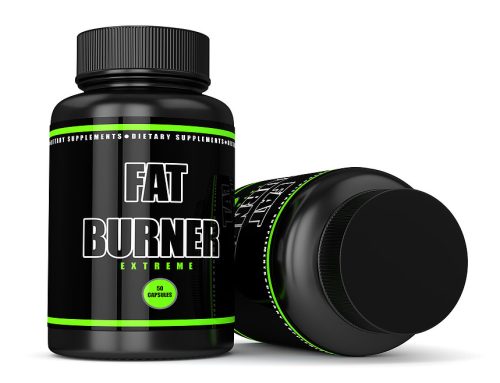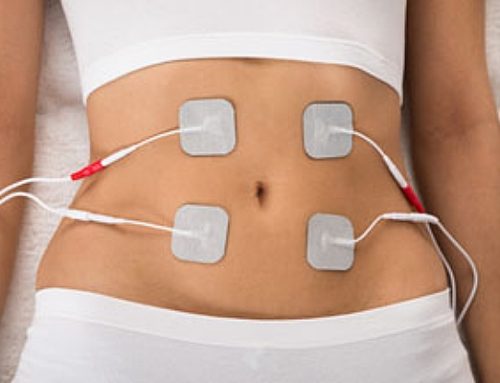Do fat burners work? If you trust scientific evidence over advertising and testimonials, no. And enough is enough with this crazy fat burner marketing.
Everywhere we go, we are being inundated with ads promising us that taking a few pills a day will burn fat. Turn on the television and you hear doctors recommending the latest and greatest fat burner (here’s a little secret: most doctors take only one class in nutrition during their education, and thus know very little about nutrition and metabolism).
If you want to waste your money on fat burners, don’t keep[ reading. If you want to learn the truth, read this whole page carefully. We’re going to take an evidence-based (scientific) approach, and see what the actual scientific research says about these popular fat burners.
 A Quick Tangent on Research
A Quick Tangent on Research
Before we dissect the 10 most popular fat burners, I want to take a moment to talk a little about scientific research. If you want to skip this section, go ahead, but I think it will help your understanding a lot.
Due to cost and time considerations, a lot of studies are done on rats instead of humans. It’s a lot easier to get 50 rats doing what you want, when you want, how you want. You can see the effects of various supplements across generations and over a long period of time. You can do things to rats you really can’t do to humans.
Rats are great. But they are also not humans (an understatement!). Often times we come across promising research that works in rats but is useless when applied to humans.
Research originally happens in rats and human cells in test tubes or petri dishes. This is an important distinction – a human body spends a lot of energy and effort regulating what goes on within. A human cell inside a test tube is free from those constraints. So what may be extremely effective in a test tube can be completely useless inside our regulated bodies.
Once we start studying humans, even then the quality of research can vary dramatically. Double-blind studies, the “gold standard,” are when you have two groups of people: One takes the supplement you are testing, and the other takes a placebo (usually a sugar pill). Neither the participants nor the researchers know who belongs in what group – this is what makes the test “double blind.” Researchers try to make sure the two groups are mostly the same, so that if any changes do occur, you know it was because of the supplement, and not other factors. The group that takes the placebo is called your control group, and is basically your quality control.
Weak evidence is when you make grand statements while you skip on all that quality control. When you test only on rats; when you test on only a few people; when you don’t do double-blind testing; when you only see what happens in a few days and not over months.
Basically: The quality of research matters. A lot.
Also of importance is that different people can respond to treatments differently. For example, men may respond differently than women in some instances. Other research is conducted on people of a certain body type. Because of their weight and its associated metabolic damage, it’s easier to get a positive response to a supplement when dealing with obese people. When the same supplement is given to people with more normal weight and metabolisms, the positive results can easily disappear.
Now that you know how people can twist legitimate but inconclusive research into “supplement x will make you lose 10lb!” (while they take your cash), let’s actually break down the marketing claims when it comes to the 10 most popular fat burners.
The Claim: A “miracle” fat burner. It’s a source of chlorogenic acid, which gets lost when coffee beans are roasted. Chlorogenic acid is supposed to slow down your body’s absorption of glucose, which promotes weight loss.
The Reality: Green coffee bean was found to have a slight effect in obese people. For people who are merely overweight, it is unlikely to have any effect. Furthermore, the positive research was industry funded, so take that research with a grain of salt.
Other Notables: Surprisingly, green coffee bean extract could be a health supplement in itself! It could help with your cardiovascular system, and potentially cognition too. The research is far too early to make any proper recommendations.
The Claim: 5-HTP is converted to serotonin in the brain, which is supposed to suppress hunger.
The Reality: It does suppress hunger – by making you nauseous! That is the “magic” – taking 5-HTP makes you feel nauseous, and you end up eating slightly less. It should be noted that the oft-recommended dosage of 200mg/day is well below the dosage you need before you notice it.
Other Notables: 5-HTP is actually used to help treat depression, as it gets converted to serotonin in your brain (people suffering from depression tend to have lower amounts of serotonin). For those taking anti-depressants, taking 5-HTP could potentially cause serotonin syndrome, a condition where serotonin reaches toxic levels and can induce cardiac arrest.
Garcinia Cambogia, aka Gambooge
The Claim: Superlatives used to describe this fruit-based supplement include: “breakthrough,” “magic,” “holy grail” and “body-fat buster.” Gambooge is supposed to burn fat because it is a great source of hydroxycitric acid (HCA), which is supposed to decrease your appetite. The supplement you buy is usually the HCA extracted from the fruit.
The Reality: Gambooge has research on it dating back to 15 years ago. A recent systematic review (in which researchers look at all relevant research to make a general recommendation) of over 700 participants concluded that gambooge has an irrelevant effect on your bodyweight.
Gambooge is a great example of the rats vs humans issue. While it was very promising in rats, human studies found none of those benefits.
Other Notables: Garcinia cambogia is traditionally used to enhance the flavor of food. The fruit itself has a sour taste (like lemons), and is frequently used in curries. In traditional medicine, garcinia cambogia is used as a laxative!
The Claim: Of all the “doctor-recommended” fat burners, this is the most popular one. Extracted from raspberries, this compound is meant to promote lipolytic activity. In simpler terms, it’s supposed to cause fat breakdown.
The Reality: Raspberry ketones were found effective in rat studies, at a very high dosage. That’s it. There is literally zero legitimate research done in humans. Extrapolating from some rat studies and applying them wholesale to humans is disingenuous.
Even the results in the rat studies were pathetic! It was as effective as taking a car from 42 MPG to 42.1 MPG.
Other Notables: Its fame is exponentially greater than its efficacy. Raspberry ketones are the best example of what marketing and vague “backed by scientific research” claims can do. For those who have experienced fish burps, some people get raspberry burps when taking this supplement.
There is some evidence that applying raspberry ketone cream could help improve your skin and hair!
The Claim: There are four main polyphenols (a kind of compound commonly found in nature) in green tea. The most potent of them is EGCG, which is supposed to promote fat burning. The four polyphenols interact with each other in a health-boosting manner.
The Reality: For once, a fat-burning supplement (kind of) delivers! There are human studies that shows consuming green tea/EGCG helps burn more fat and decrease your overall fat mass. While it’s not by a lot, there is at least evidence that it works!
The catch? It seems to only work on those who don’t regularly consume caffeine. If you regularly drink coffee or tea, the fat-burning effects of green tea/EGCG are heavily compromised.
Other Notables: First of all, the supplement itself comes in a variety of combinations – green tea catechins (a form of polyphenols), green tea extract (crushed raw green tea which contains green tea catechins) and EGCG. Our recommendation is that you buy green tea extract, and that it be roughly 50% EGCG.
The other interesting note is how healthy green tea is for you! It has positive effects throughout your body such as low-grade anti-oxidative and anti-inflammatory properties paired with a reduction in cancer risk. I drink green tea regularly (even though I think it tastes horrible) just for its health benefits.
The Claim: Caffeine is supposed to increase your metabolism. This lets your body use your fat reserves for energy, which means less fat stored.
The Reality: Caffeine is a potent stimulant, and does indeed increase your metabolism.
But just like green tea, caffeine only works if you are not used to it. As you become a regular user, its stimulant effects wear off, and so does the boost to your metabolism. For caffeine to be effective, you need to cycle its usage.
It should be noted that potent is relative – yes caffeine burns fat, but the bulk of your fat loss will be through your diet. Since you become used to caffeine, it is not an effective everyday fat burner. It can help, but it’s not something you can rely on every day.
Other Notables: Caffeine is a stimulant, and you have to be careful not to abuse it. It increases your blood pressure, and can also negatively impact your sleep if you take it too close to bed time.
The two main dietary sources of caffeine (tea and coffee) have a host of health benefits themselves (we covered green tea above). With that in mind, caffeine is a cool supplement because it has a slight effect on a lot of things: adrenaline, testosterone, workout ability, reaction time and more. Two other interesting sources are yerba mate and guarana.
Conjugated Linoleic Acid, aka CLA
The Claim: CLA is supposed to interact with the peroxisome proliferator activated receptor (PPAR) system in your body, which is related to fat metabolism inside your body.
The Reality: A common theme emerges – what works in rats does not work in humans. CLA barely interacts with the PPAR system, rendering it unreliable. The end result? No fat burning.
Other Notables: CLA was one of the first promising fat burners, and thus there is a lot of research conducted on it: over 20 human studies! Alas, while most of the other supplements listed here have some other interesting tidbit, CLA seems to be a very uninteresting and boring molecule.
7-keto, related to DHEA
The Claim: Stimulates your thyroid to increase your body’s metabolism. This means less fat is stored.
The Reality: 7-keto is one of three oxygenated metabolites of DHEA, a naturally occurring hormone in your body. Studies do seem to indicate that 7-keto can increase your metabolism, but the quality of research is extremely iffy (due to conflicts of interest). At this time no statement can be made as to whether 7-keto works or doesn’t.
Other Notables: While its parent, DHEA, is a hormone, 7-keto itself is not hormonal (which means less potential side effects).
White Kidney Bean Extract, aka Phase 2
The Claim: Prevents the breakdown of carbs into simple sugars, so they are not absorbed by your body. As a result, complex carbs pass through your digestive system unabsorbed.
The Reality: White kidney bean extract does seem to reduce the absorption of carbohydrates, but its potency is so weak that it has little overall effect. It’s as effective as having a few less bites of food.
Other Notables: You may think that white kidney bean extract sounds like fibre, but they are not the same. Fibre still helps in digestion, and it also interacts with intestinal bacteria. For better or worse, white kidney bean extract makes you poop sugar and starch.
L-Carnitine, aka ALCAR (Acetyl-L-Carnitine)
The Claim: L-Carnitine helps shuttle fats into your mitochondria (the “powerhouse” of a cell), where they get burned off.
The Reality: Another supplement which works in theory, but does not work in reality. Supplementation only works in burning fat if you are deficient (which is common only in very elderly people); taking more carnitine than your body needs results in no extra fat burning. This is likely due to your body’s regulatory facilities.
Other Notables: L-Carnitine is used as a brain booster, increasing alertness and neuronal support. It can even help alleviate side effects of aging (neurological, fatigue) for those in a weakened state.
Want to learn more?
We’ve collated all of our research at Examine.com. In fact, for the 10 supplements we mentioned, we have references to over 1000 scientific papers. If you want to learn more, there is a lot more to dig into.
At the end of the day, even though some fat burners do work, the amount of fat they actually burn is small. Unless you are working on the last few pounds, they won’t be noticeable. Want to know what burns fat? Be smart about what you eat.
About Sol Orwell and Kurtis Frank
Sol Orwell and Kurtis Frank are co-founders of Examine.com, where they collate scientific research on supplementation and nutrition. Featuring over 16,000 citations. Learn more by visiting http://examine.com/store/reference/






I’ve tried three different fat burners in the past and they all made me feel jittery and awful. I didn’t get any results either.
I’m happy to say that I’ve lost 32 pounds in the last 13 weeks by focusing on my nutrition and exercise.
As Tom puts it “Diet = weight loss (likely regained). Training + Nutrition = transforming your body.” That’s what I believe in.
I’ve had very similar experiences Hassan. I am also glad to say that i have lost 10 lbs in 6 weeks from a good training + nutrition plan.
It sounds great but could you cite the actual studies to back it up?
Penny – the supplement titles are clickable – I included the links – at sol’s site they include all the specific references and or they can provide them. Cheers! Tom.
ps. Example: http://examine.com/supplements/Raspberry+Ketones/ – lists the following:
Harada N, et al. Effect of topical application of raspberry ketone on dermal production of insulin-like growth factor-I in mice and on hair growth and skin elasticity in humans. Growth Horm IGF Res. (2008)
The application of raspberry ketone to successful body care
Park KS. Raspberry ketone increases both lipolysis and fatty acid oxidation in 3T3-L1 adipocytes. Planta Med. (2010)
Lin CH, et al. Evaluation of in Vitro and in Vivo Depigmenting Activity of Raspberry Ketone from Rheum officinale. Int J Mol Sci. (2011)
Cation-Exchanged Montmorillonite-Catalyzed Facile Friedel-Crafts Alkylation of Hydroxy and Methoxy Aromatics with 4-Hydroxybutan-2-one To Produce Raspberry Ketone and Some Pharmaceutically Active Compounds
Beekwilder J, et al. Microbial production of natural raspberry ketone. Biotechnol J. (2007)
Feron G, et al. Microbial production of 4-hydroxybenzylidene acetone, the direct precursor of raspberry ketone. Lett Appl Microbiol. (2007)
Gaunt IF, et al. Acute and short-term toxicity of p-hydroxybenzyl acetone in rats. Food Cosmet Toxicol. (1970)
Sporstøl S, Scheline RR. The metabolism of 4-(4-hydroxyphenyl)butan-2-one (raspberry ketone) in rats, guinea-pigs and rabbits. Xenobiotica. (1982)
Morimoto C, et al. Anti-obese action of raspberry ketone. Life Sci. (2005)
Wang L, Meng X, Zhang F. Raspberry ketone protects rats fed high-fat diets against nonalcoholic steatohepatitis. J Med Food. (2012)
Ogawa Y, et al. Effect of essential oils, such as raspberry ketone and its derivatives, on antiandrogenic activity based on in vitro reporter gene assay. Bioorg Med Chem Lett. (2010)
Effect of topical application of raspberry ketone on dermal production of insulin-like growth factor-I in mice and on hair growth and skin elasticity in humans
Holst L, Haavik S, Nordeng H. Raspberry leaf–should it be recommended to pregnant women. Complement Ther Clin Pract. (2009)
Parsons M, Simpson M, Ponton T. Raspberry leaf and its effect on labour: safety and efficacy. Aust Coll Midwives Inc J. (1999)
Parsons M, Simpson M, Wade K. Labour and the raspberry leaf herb. Pract Midwife. (2000)
Jing Zheng, et al. The effects of commercial preparations of red raspberry leaf on the contractility of the rat’s uterus in vitro. Reprod Sci. (2010)
Simpson M, et al. Raspberry leaf in pregnancy: its safety and efficacy in labor. J Midwifery Womens Health. (2001)
Very comprehensive and helpful article. I was surprised to see ma huang/ephedra/ephedrine left off the list. Thoughts? Feedback? Thanks.
As you cannot really get E itself legally, we opted to not include it.
You can in Canada :).
I drink green tea every day also and am not crazy about the flavor…I have found that brewing one bag of organic green tea along with one bag Celestial Red Zinger Berry tea in 2 cups of water works BEAUTIFULLY…gives it a nice berry flavor and hibiscus tea is also loaded with antioxidants, just a little tip to help your green tea consumption.
Excellent article and well timed with summer approaching and people looking for a quick fix.
Personally I use only a good quality caffeine supp and i like guarana as well. Not so much for the fat burning but for the extra focus in and out of the gym.
Well done guys hopefully people will take note and start spending their money on good quality foods and less on over hyped supplements
H
Yes. Well written and researched. I think people understand there is no magic pill or potion for weight loss. Just healthy eating and exercising correctly.
When I see ads for weight loss pills, the small print states something like the following “to be taken in conjunction with a healthy diet and regular exercise”. Amusing.
Hey Sol,
Very interesting article.
Lyle McDonald and Martin Berkhan seem to understand that Yohimbine HCL can be useful for mobilizing stubborn body fat.
What’s your take based on the research?
Cheers, Tim
Agreed with them. Except, it’s nowhere near as simple as taking a pill. You need to match four things:
1. Already be reasonably lean
2. Ingest it while in a fasted state
3. Do some form of cardio after ingesting it
4. Not suffer from anxiety/BP/heart issues
Simplistically, yohimbine helps mobilize fat cells in the “stubborn body fat” area. But if you have issues with any of the four things above, it is not for you.
I personally refer to it as a fat mobilizer, not as a fat burner.
Great insights on fat burning, a lot of people are trying to deal with belly fat.
What about Fucoxanthin?
Rob, sol may have new info, but last time i looked it was all mouse/ rat research with ONE lone human study financed by the patent holder. “miracle seaweed” highly unconvincing. Sol?
Here’s our Human Trials database for fucoxanthin: http://i.imgur.com/S81i4Np.png
There is a little bit of evidence, but really nothing useful.
Fucoxanthin is also an interesting one – it’s something you have to take for a while, let it get stored in fat cells, and then watch as it kind of burns the fat cells from the inside.
Does it actually work? We literally do not really know. The research is light and suspect, so best to withhold judgement.
Great article guys and very well referenced. The biggest challenge is getting the info out there and getting people to believe in science rather than marketing hype or some fancy scientific jargon posted in a magazine ad.
As a personal trainer and nutritionist whenever I provide a nutrition plan consisting of nutritious whole foods I get a very surprised and sometimes criticized response as the general consensus is that when you are trying to lose fat you should be taking fat burners every day and living on protein shakes.
Articles like these backed up by scientific research helps spread the word and teach people to look further than the a magazine add or label on a bottle of so called “fat burners”.
Be smart about what you eat! Totally agree. I have been a gym member for over 26 years and have never taken any supplements apart from fish oil. My weight has remained at 58-59 kg all my adult life (except during pregnancies). The key to maintaining a healthy weight is to eat sensibly and to exercise regularly. I also do a lot of weight training and have never felt the need to take extra protein after a work-out. I figure the salmon or chicken in my lunch time sandwich will do the trick!
Well I would guess you just burst the bubble for quite a few readers. Still, there will continue to be a continuous stream of new pills and supplements and gadgets that people will empty their wallets for. I have to admit I still participate once in awhile.
It is really hard to trust the studies done in rats since we have a different molecular and DNA structure. Unless, there are great reviews or proofs provided to us by humans who tested it, then I suggest not to believe that these products are going to work.
I THINK PEOPLE ARE ALWAYS TRYING TO FIND THE EASY WAY OUT. THATS HOW STEROIDS CAME INTO PLAY. NOTHING BEATS GOOD OLD FASHIONED HARD WORK AND CARDIO, EATING CLEAN WHEN IT COMES TO FAT LOSS AND WEIGHT LOSS.
I also agree with Tom. My life experience had shown me, to change your health and appearance you have to make a lifestyle change. You may lose weight with “dieting” but as soon as you go off your diet and your old habits come back, your old body comes back. Only with good nutrition and a regular exercise routine (changing your lifestyle for good) will you get the results you want for a lifetime.
As far as the fat burners go. I’ve had some decent results with the green tea extract.
Fantastic post! The only way to burn fat is to exercise regularly!
An excellent and concise summary covering a large variety of chemicals and substances. Personally I was mostly interested in the metabolism boosting aspect of caffeine consumption, but seeing that I am already an avid coffee drinker even this little gambit has run its course.
It seems that the only effective way to weight loss is the tried and true “consume less than your normal daily caloric intake” method with a little bit of additional power of will.
Cheers.
I read somany articles on fat burning and tried but fed of all the products and this article clearly states that this is proven fact in scientific manner for the products been mentioned on Raspberry Ketones,Carnitine,Green Tea and so on.
Thanks for sharing such valuable info